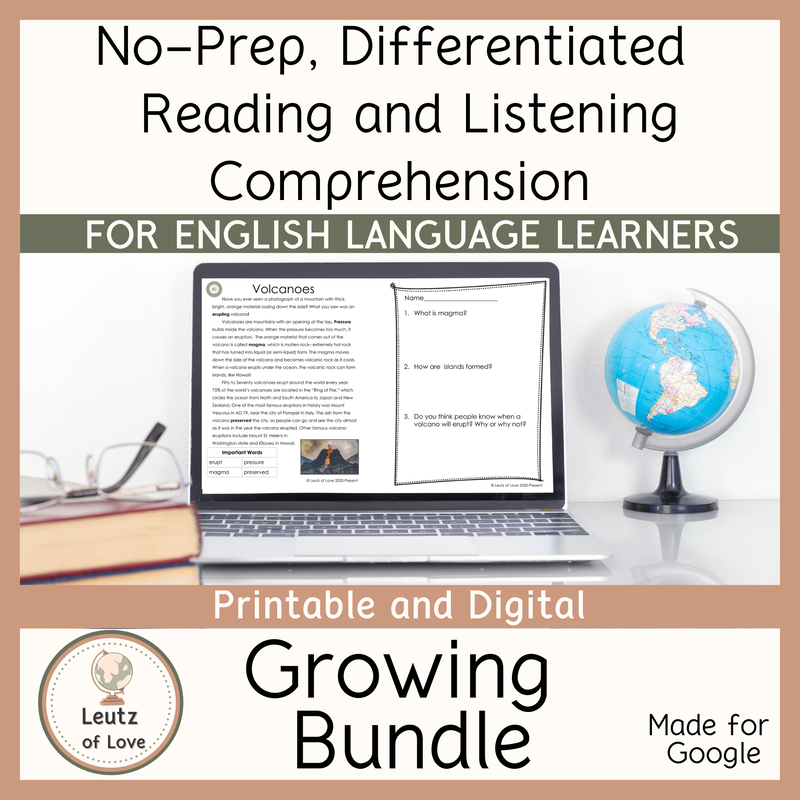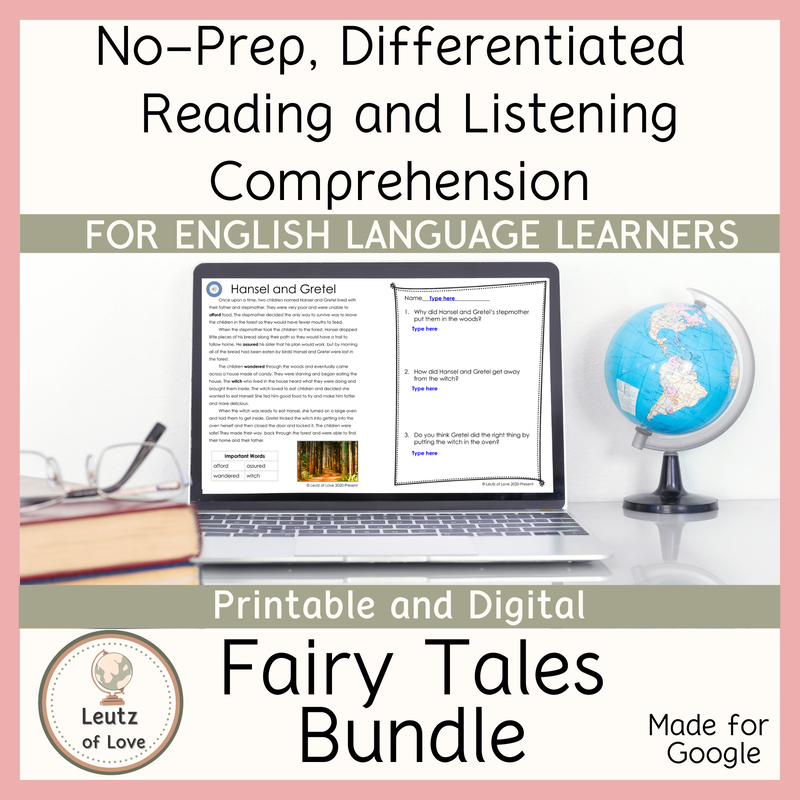Using an ESL Interpreter doesn't have to be a challenge! Read up on these tips and tricks to make your interpreted conversations clear and productive!
Have you ever used an ESL interpreter and everything was just…perfect? Conversation flowed seamlessly, cultural misunderstandings were explained before they actually became misunderstandings, and both you and the parent came away from the conversation feeling completely in sync?
It’s possible! In fact, it’s possible for your entire ESL teaching day to feel close to perfect, every day! Click here to download my guide on How to Become the Secondary ESL Teacher of Your Dreams. It’s true that interpreted conversations don’t always go according to plan. Sometimes the phone has too much static, or the topic requires a lot of specialized knowledge to interpret well. Sometimes, you have to hang up and call back for a new interpreter because the parent sitting across from you has to let you know the interpreter doesn’t actually speak the language they claimed to speak (true story). Even with the hiccups, you’re interpreted conversations can go right more often than not! Follow these tips and tricks for smooth, effective conversations when using an interpreter as an ESL teacher. Interpreter vs. Translator
The first step to having awesome interpreted conversations is being able to talk the talk! Interpreter and Translator might sound like they’re interchangeable, but there’s a slight difference! Interpreters work with spoken word, and translators work with writing. Get the lingo right, and you’ll gain your interpreter’s respect immediately!
How do I find an ESL Interpreter?
Schools are required by law to provide information in a language that parents and guardians can understand. That means if your school says they do not have the ability to provide translation or interpretation, they are out of compliance! Remind your administration of this requirement, and if needed, provide suggestions on how to fix it. It is a federal law, so they’ll likely be willing to fix it right away (trust me, I’m speaking from experience here!) If not, this flier has information for contacting the Department of Education and the Department of Justice’s Civil Rights Division. (Just scroll to the bottom!)
The easiest form of finding an interpreter is using a language line! There are many language lines out there, but you should get some sort of code from your school. Follow the instructions when you call to input your code, then speak the name of the language you need when prompted. Be sure to listen carefully to the confirmation…some language names sound similar, and sometimes the automated line just won’t catch what you said!
While language lines are the easiest form of interpretation, the best is always having a real person in the room! Check to see if your school has local interpreters on call for big events like parent-teacher conferences or registration nights. Your school might also have access to community navigators, who are designated community members who help others of the same language and/or cultural background find and use resources and navigate life where they live. My Student Speaks Great English, Can’t I Just Use Them to Interpret?
No! Though using a student or their sibling to interpret is standard practice in many schools, the Department of Justice actually states that schools are not allowed to use a child as an interpreter. Families are entitled to a trained interpreter.
Are there any exceptions to this rule? Generally no, but in casual conversation it’s ok. I usually ask myself the question: “Would I have an English speaking child tell their parents this information without a flyer or otherwise contacting them?” If yes, then I go ahead and let the child “interpret.” For example, something like “Tell your mom the treats you brought in were delicious!” or “Let your grandpa know how great you did on your reading test today!” would be fine. Something like “We have an IEP meeting next week to discuss how to help your child with their learning disorder” is a definite no! So I Have a Professional ESL Interpreter on the Line. Now What?
I’d be willing to bet that as an ESL teacher, you’re going to use phone interpreters most frequently! That’s great! Phone interpreters are amazing and we are so lucky to have access to them! Here’s a few tips to make your conversation successful.
Call the interpreter first Most interpretation lines will be able to call the parent or guardian for you! Call the interpreter line first. It helps to give a little summary of what the call will be about during this time, too! I like to tell the interpreter if we’re making a positive call home, scheduling a meeting, discussing a behavior challenge, etc. I’ve found that it helps the interpreter prepare for how the conversation might go and starts us out on the right foot! Ask for the interpreter to interpret cultural differences The best interpreter I had was my first year teaching in public schools. I don’t remember the context of the situation, but I do remember him stopping and saying, “This is the interpreter speaking. This might be a bit confusing for someone from Haiti. Do you mind if I explain how the expectation in the USA?” It. Was. AMAZING. Our conversation went so much smoother, and I realized how much can be different or unfamiliar for families! Interpreters generally are not allowed to add their own commentary into the conversation…unless you ask! Their job is to interpret exactly what is said on both sides of the line, but sometimes, that’s just not enough. Now I ask them to clarify any cultural differences in that time when I call the line and before they call the family! Just say something like this: “The family we are calling is from (country). If you notice me saying something that might be confusing or unfamiliar to them, would you mind clarifying?” 9 times out of 10, the interpreter is thrilled to help and misunderstandings are cleared up right away.
“This is the interpreter speaking.”
Did you catch that phrase up above? The first time I heard this on the phone, it threw me off guard. “Of course it is! You’re a man, and I’m calling grandma. Obviously it’s you!” Well, if you’re as confused as I was that first time, this is the interpreter’s way of interjecting or asking clarifying questions. The interpreter is the voice of you and the other person on the line. When they state “This is the interpreter speaking,” it’s to let you know that they personally need something, and that question is not being asked by the family you called! Talk to the family, not to the interpreter Remember that the interpreter is your tool in a conversation! When speaking, remember the interpreter will say exactly what you say. That means you should be saying “What do you think about this?” instead of “Could you ask her what she thinks about this?” It can be reassuring for the family to hear familiar names and words while you are talking though, too. Every so often, use the parents name in conversation, but remember you’re still talking to them! This might look like “Mrs. Ahmed, do you have any concerns about Fatima’s performance?” This helps them know that they’re being spoken to, and also helps them connect what the interpreter says to what you say! It’s like a built-in check that things are being interpreted correctly. Keep it Simple Remember that while you may be using an ESL Interpreter who is contracted with a school, most times they are not a teacher themselves! Remember to explain acronyms, numbers, scores, etc., even if you know the parent will know what you are talking about. For example, when I taught in Arizona, all my ESL students took the AZELLA test. Now, all of my families knew exactly what the AZELLA was, but an interpreter might think they’re hearing things! A simple clarification is all you need. For example, “Our AZELLA test will start on Monday at 9am. Interpreter, just so you know, the AZELLA is our state test for English Language Learners. Uncle will know what that means.”
Keep it Short and Sweet
When we’re talking directly to a parent, it’s easy to go on and talk for a few minutes at a time. However, even if they’re taking notes, that can be too much for an interpreter! Their job is to portray what you’re saying exactly, which means they don’t just have to remember the facts, they have to be able to share your intonation and pauses, too! A good rule of thumb is to stop every sentence or two and let them share. If there’s ever something that really needs to be shared altogether, give your interpreter a heads up! In most cases, though, simple pauses for interpretation should be fine. Looking for more tips about how to make your ESL classroom run smoothly? Click here to download my free guide to becoming the Secondary ESL Teacher of Your Dreams! Interpretation is just one part of great communication, but it’s so important! Remember that ESL interpreters make everyone’s life easier, so be clear, concise, and straightforward, and then sit back and enjoy how well everyone understands what’s going on in your classroom!
0 Comments
Your comment will be posted after it is approved.
Leave a Reply. |
Categories
All
AuthorHey there! I'm so glad you're here! Categories
All
Leutz of Love Blog |








